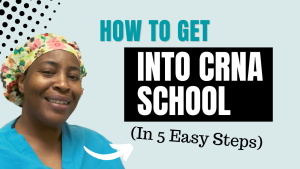It’s easy to speak the words “I’m going to be a CRNA one day”, but actually getting to that end goal is an entirely different story. We’re used to being able to go down the street to our local college and sign up for whatever course we want to take or better yet just take online courses. And before you know it you are walking down the stage receiving your hard-earned degree.
Unfortunately, this does not apply when working towards CRNA school acceptance which often leads the applicant confused and give up on their dream of being a CRNA.
So this raises the question: what are some truths in regards to becoming a CRNA?
How Does Gaining Acceptance to CRNA School Work?
Now before we go any further into the truths of pursuing the CRNA profession, it’s important to understand the admission process.
In short, you can’t just sign up for CRNA school like you did when you decided to become a nurse. There are some basic requirements you must have:
- Bachelor of Science in Nursing (BSN)
- Registered Nursing License
- 1-3 years of Critical Care / ICU experience
In addition to these requirements and to have a shot at getting accepted, you will also need to have (depending on the CRNA school):
- Cumulative GPA of 3.0 or better (3.5+ to be competitive)
- Combined Minimum GRE score of 300 or better
- Certifications (BLS, ACLS, PALS)
- Prerequisite Classes
- Shadow a CRNA (40 hours to be competitive)
- Get your CCRN certification (required or recommended by 70% of schools)
- Other Standard Requirements
Then once you feel you have a chance of acceptance you begin to gather your application material including your CV and Personal Statement and submit your application. And then you wait for an invitation to interview. If they like what they see in the interview, you usually get either a letter, email, or phone call stating you were accepted. From there you usually pay a deposit to hold your seat in the program.
This is why many mentors and coaches like myself will tell you:
“This is a marathon and not a sprint”. This is true because there will be so many struggles and setbacks because it is hard to get into CRNA school due to its competitiveness of it.
What are Some Struggles Most Applicants Deal With?
They don’t think they will ever get accepted or can do it. You would be surprised how many people message me every week saying they can’t do this. They’re not smart enough. They’re too old. They’re afraid of public speaking. They don’t test well. They don’t know how to study.
So here’s the truth- these limiting beliefs are holding you back from advancing in your nursing career. So about a year ago, an ICU nurse reached out to me her name is Courtney, and we still stay in contact to this day, right? She reached out to me via email. And she was panicking because she had a CRNA school interview coming up. And she did not think she was going to do well. She just really kept saying in the email, I don’t know why I applied, I don’t know why I felt like I can do this. And so I reached back out to her and she asked me if she could talk to me on the phone.
And I was at work. And I was like, Well, I’m at work. I probably could talk for 20 minutes in between cases. So I talk to her out in the hallway. And really just talk to her about her limiting beliefs and just try to give her some positive thoughts, positive affirmations to speak. Because I didn’t want her to sabotage her chances of you know, by going into this interview thinking negatively, right. So she did what I said and I gave her some tips on interviewing via Zoom.
They lose their motivation after applying and being rejected. I saw a post on IG of a dog carrying his own leash. Like walking itself and it says something like “when you realize no help is coming as an adult, and you just got to pick yourself up and keep moving forward”. And I thought that is so true sometimes like, we have to keep going especially to be a CRNA. Because nobody’s pushing us to do it. I guess it’s all on us.
So with my story, before I got into CRNA school, I applied to schools in my state, of course, South Carolina, and I didn’t even get an interview. Nothing it was like crickets. So then I applied out of state to different schools, and I did get two interviews. I did pretty decently on one, it was Virginia Commonwealth. And then the other was Case Western, and I did terribly. I cried all the way home on the flight.
I said I was never going to interview again, I stopped trying to get into CRNA school for a while but then I kept thinking about it. I applied one more time and got accepted to the waiting list. Again, I had to come up with a plan to get myself off of the waiting lists, right. Now, what I wanted to say about why I didn’t get accepted is usually it comes down to one of two things. If you put in an application and you’re not getting interviews it can be because you’re just not as competitive as the rest of the applications that are coming in. So you got to do something different. Now if you make it all the way to the interview, and you don’t get accepted, it means you probably didn’t do well in the interview. And so you got to get to strengthen up your interview skills.
They don’t know what to include in their personal statement. I know you’ve accomplished so much already. And so it’s hard to know where to start. But I want you to know like, that this isn’t a time to be humble, and not tell them who you are. You need to come out with the big guns like look I’ve done this, this, and this. Now you don’t want to be overly cocky, of course, and definitely don’t carry all that cockiness into your interview.
So a big tip that I always give to my clients or students on my programs is that you want to research the CRNA school before you do your CV, personal statement, or any of that because you want to see what words they’re using. And you want to tailor your application material accordingly. However, don’t make up stuff if you haven’t done what they’re asking for, you don’t want to include it but you definitely want to tailor it to what they’re asking for. Now, you also want your personal statement to read like a book like a really good read, you know, you want it to be where they don’t want to put it down.
And the best way to do that, in my opinion, is by using a short story or anecdote. And when you do that, you’re holding their attention. And they’re kind of like, oh my, like what’s happening next? I got to keep reading, right. And so another really great tip is that you want to start that story or anecdote, anecdote out in the middle of the story. So instead of saying “I walked into the hospital, and I met Kiki the CRNA. And we went over and met the patient”. You would say:
“As soon as I hit the door, I realized this is where I needed to be. I immediately saw the patient”.
So that’s how you start in the middle of the story.
Obtaining your CCRN certification. This is a big problem for many aspiring CRNAs because the fact is you all are really busy people. Because I remember when I was an ICU nurse. And I remember having a family having kids and I was like I just don’t have time to study for this certification.
But I knew in order to increase my chances of gaining acceptance into a CRNA program, I had to take pass this exam. So if you already have this certification, you’re one step ahead of a lot of applicants out there, which is huge, you should be happy, and pat yourself on the back. You’re definitely ahead of a lot of the applicants.
And you know, I would also shoot for getting other certifications like, you know, the cardiac surgery certification, if that’s your area, also cardiac medicine certification. So CSC and CMC, and there’s even a moderate sedation certification. One other thing you can do is you can just Google nursing certification and you will get a list of all of them.
And then you need to look at what qualifications and experience you already have. And compare those. So you’re not having to go out and reinvent the wheel and go get all this experience and stuff. That way, you can fast-track and get that certification as well. Now having done your research, you need to find your exam study material. A great thing is to have an access to a mentor, someone who’s been through that before and is able to get that information to you is crucial. So coming on the Inner Circle, is Nicholas McGowan, founder and lead instructor of the Critical Care Academy review course, which has a 100%. Pass satisfaction guarantee on the 1st try. So you’re not even losing your money.
Essential Thoughts
If you’re ready to fast-track your way to CRNA school acceptance. It’s time to do something different. It’s time to stop talking about it. And it’s time to start doing something different. If you’re aware of the hard truths and struggles of getting into a CRNA program and still want to pursue keep persevering. Also, you need to get in the room with your people because it is a game-changer. When I finally went to an Information Session For CRNA school and was around like-minded people that’s when everything changed for me. And that’s what I want for you. So if you need further help becoming a CRNA join the Future CRNA Inner Circle, a great community of nurses and aspiring CRNAs.
About The Author
Although hundreds of critical care nurses visit Kiki’s blog each month to learn more about the CRNA profession, her path to becoming a CRNA was not easy. Go here to read her incredible story, “My CRNA Journey: Surgical Tech To CRNA- The Unbelievable“. For a complete guide that shows you exactly how to become a CRNA, grab a copy of the “Ultimate Guide to CRNA School Admission”. It’s FREE and will save you a ton of time and headaches since all the info you need is in one place.







